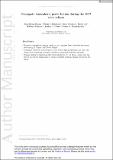| dc.contributor.author | Zhang, Shun‐Rong | |
| dc.contributor.author | Erickson, Philip J. | |
| dc.contributor.author | Vierinen, Juha | |
| dc.contributor.author | Aa, Ercha | |
| dc.contributor.author | Rideout, William | |
| dc.contributor.author | Coster, Anthea J. | |
| dc.contributor.author | Goncharenko, Larisa P. | |
| dc.date.accessioned | 2022-02-16T19:03:57Z | |
| dc.date.available | 2022-02-16T19:03:57Z | |
| dc.date.issued | 2021-01-16 | |
| dc.identifier.issn | 2169-9380 | |
| dc.identifier.issn | 2169-9402 | |
| dc.identifier.uri | https://hdl.handle.net/1721.1/140438 | |
| dc.description.abstract | We report new findings of total electron content (TEC) perturbations in the southern hemisphere at conjugate locations to the northern eclipse on August 21, 2017. We identified a persistent conjugate TEC depletion by 10%–15% during the eclipse time, elongating along magnetic latitudes with at least ∼5° latitudinal width. As the Moon's shadow swept southward, this conjugate depletion moved northward and became most pronounced at lower magnetic latitudes (>−20°N). This depletion was coincident with a weakening of the southern crest of the equatorial ionization anomaly (EIA), while the northern EIA crest stayed almost undisturbed or was slightly enhanced. We suggest these conjugate perturbations were associated with dramatic eclipse initiated plasma pressure reductions in the flux tubes, with a large portion of shorter tubes located at low latitudes underneath the Moon's shadow. These short L-shell tubes intersect with the F region ionosphere at low and equatorial latitudes. The plasma pressure gradient was markedly skewed northward in the flux tubes at low and equatorial latitudes, as was the neutral pressure. These effects caused a general northward motion tendency for plasma within the flux tubes, and inhibited normal southward diffusion of equatorial fountain plasma into the southern EIA region. We also identified posteclipse ionospheric disturbances likely associated with the global propagation of eclipse-induced traveling atmospheric disturbances in alignment with the Moon's shadow moving direction. | en_US |
| dc.language | en | |
| dc.publisher | American Geophysical Union (AGU) | en_US |
| dc.relation.isversionof | http://dx.doi.org/10.1029/2020ja028531 | en_US |
| dc.rights | Article is made available in accordance with the publisher's policy and may be subject to US copyright law. Please refer to the publisher's site for terms of use. | en_US |
| dc.source | Wiley | en_US |
| dc.title | Conjugate Ionospheric Perturbation During the 2017 Solar Eclipse | en_US |
| dc.type | Article | en_US |
| dc.identifier.citation | Zhang, S-R., Erickson, P. J., Vierinen, J., Aa, E., Rideout, W., Coster, A. J., & Goncharenko, L. P. (2021). Conjugate ionospheric perturbation during the 2017 solar eclipse. Journal of Geophysical Research: Space Physics, 126, e2020JA028531. | en_US |
| dc.contributor.department | Haystack Observatory | |
| dc.relation.journal | Journal of Geophysical Research: Space Physics | en_US |
| dc.eprint.version | Author's final manuscript | en_US |
| dc.type.uri | http://purl.org/eprint/type/JournalArticle | en_US |
| eprint.status | http://purl.org/eprint/status/PeerReviewed | en_US |
| dspace.date.submission | 2022-02-09T20:15:12Z | |
| mit.journal.volume | 126 | en_US |
| mit.journal.issue | 2 | en_US |
| mit.license | PUBLISHER_POLICY | |
| mit.metadata.status | Authority Work Needed | en_US |
